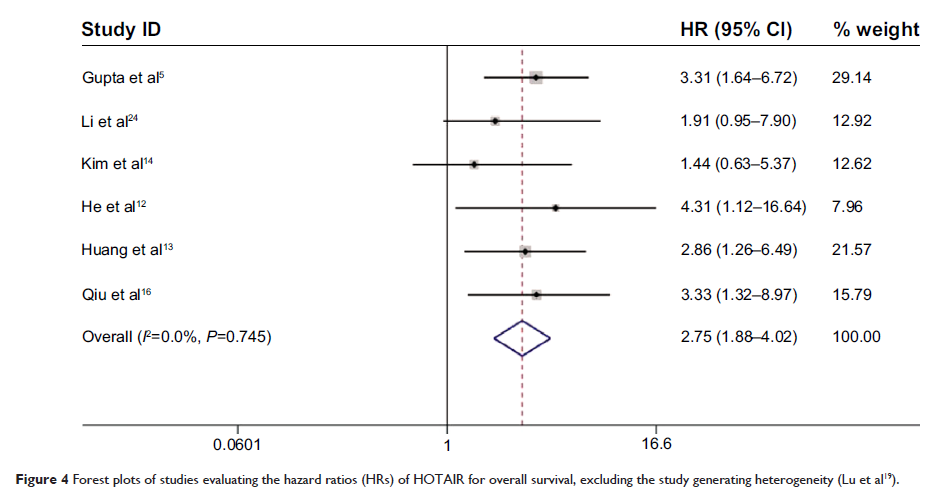109669
论文已发表
注册即可获取德孚的最新动态
IF 收录期刊
- 3.4 Breast Cancer (Dove Med Press)
- 3.2 Clin Epidemiol
- 2.6 Cancer Manag Res
- 2.9 Infect Drug Resist
- 3.7 Clin Interv Aging
- 5.1 Drug Des Dev Ther
- 3.1 Int J Chronic Obstr
- 6.6 Int J Nanomed
- 2.6 Int J Women's Health
- 2.9 Neuropsych Dis Treat
- 2.8 OncoTargets Ther
- 2.0 Patient Prefer Adher
- 2.2 Ther Clin Risk Manag
- 2.5 J Pain Res
- 3.0 Diabet Metab Synd Ob
- 3.2 Psychol Res Behav Ma
- 3.4 Nat Sci Sleep
- 1.8 Pharmgenomics Pers Med
- 2.0 Risk Manag Healthc Policy
- 4.1 J Inflamm Res
- 2.0 Int J Gen Med
- 3.4 J Hepatocell Carcinoma
- 3.0 J Asthma Allergy
- 2.2 Clin Cosmet Investig Dermatol
- 2.4 J Multidiscip Healthc

已发表论文
HOTAIR 在四例雌激素依赖性恶性肿瘤治疗中的预后作用的综合分析
Authors Li J, Wen W, Zhao S, Wang JX, Chen JY, Wang YR, Zhang QY
Published Date June 2015 Volume 2015:8 Pages 1471—1482
DOI http://dx.doi.org/10.2147/OTT.S84687
Received 15 March 2015, Accepted 20 April 2015, Published 15 June 2015
Approved for publication by Professor Daniele Santini
Background: HOX transcript antisense intergenic RNA (HOTAIR), a long non-coding RNA transcribed from the antisense strand of the HOXC gene locus, has been shown to be overexpressed in various carcinomas and is thought to be an indicator of poor prognosis. Recently, HOTAIR was found to be an estrogen-responsive gene. We therefore conducted a meta-analysis to systematically summarize and clarify the association between HOTAIR expression and prognosis in the four main estrogen-dependent tumors.
Methods: A systematic search of studies that examined the association and prognostic impact of HOTAIR in four of the main estrogen-dependent tumors was conducted in PubMed and Embase. Hazard ratios (HRs) and 95% confidence intervals (95% CIs) were calculated to pool the effect size.
Results: A total of 1,200 patients from eight eligible studies were included. The current study found an association between HOTAIR expression and overall survival (OS) in four estrogen-dependent tumor types (HR, 1.99; 95% CI: 1.02–3.90; P Heterogeneity =0.001). Subgroup analyses indicated that high HOTAIR expression appeared to be a potential prognostic biomarker in non-breast cancer patients (HR, 2.72; 95% CI: 1.65–4.48). There was also an increased risk in Asian populations (HR, 2.55; 95% CI: 1.62–4.00) compared with Caucasian populations (HR, 1.19; 95% CI: 0.16–8.83) and in patients without preoperative treatment (HR, 2.55; 95% CI: 1.62–4.00) compared with patients with preoperative treatment (HR, 1.19; 95% CI: 0.16–8.83). In addition, the HRs of patients with high HOTAIR expression for metastasis-free survival (MFS), relapse-free survival (RFS), and disease-free survival (DFS) were 2.30 (P =0.120), 1.39 (P =0.000), and 2.53 (P =0.714), respectively, but there were insufficient data to fully confirm these associations.
Conclusion: HOTAIR may be a predictor of poor prognosis in four of the main estrogen-dependent tumors, especially in cervical, ovarian, and endometrial cancer patients without preoperative treatment in Asian populations. It is important to note that the prognostic value of HOTAIR in MFS, RFS, and DFS should be interpreted with caution due to the limited sample size and sample heterogeneity. Well-designed and larger-scale studies are needed to validate our findings.
Keywords: HOTAIR, prognosis, estrogen-dependent tumors, breast cancer, cervical cancer, ovarian cancer, endometrial cancer
Methods: A systematic search of studies that examined the association and prognostic impact of HOTAIR in four of the main estrogen-dependent tumors was conducted in PubMed and Embase. Hazard ratios (HRs) and 95% confidence intervals (95% CIs) were calculated to pool the effect size.
Results: A total of 1,200 patients from eight eligible studies were included. The current study found an association between HOTAIR expression and overall survival (OS) in four estrogen-dependent tumor types (HR, 1.99; 95% CI: 1.02–3.90; P Heterogeneity =0.001). Subgroup analyses indicated that high HOTAIR expression appeared to be a potential prognostic biomarker in non-breast cancer patients (HR, 2.72; 95% CI: 1.65–4.48). There was also an increased risk in Asian populations (HR, 2.55; 95% CI: 1.62–4.00) compared with Caucasian populations (HR, 1.19; 95% CI: 0.16–8.83) and in patients without preoperative treatment (HR, 2.55; 95% CI: 1.62–4.00) compared with patients with preoperative treatment (HR, 1.19; 95% CI: 0.16–8.83). In addition, the HRs of patients with high HOTAIR expression for metastasis-free survival (MFS), relapse-free survival (RFS), and disease-free survival (DFS) were 2.30 (P =0.120), 1.39 (P =0.000), and 2.53 (P =0.714), respectively, but there were insufficient data to fully confirm these associations.
Conclusion: HOTAIR may be a predictor of poor prognosis in four of the main estrogen-dependent tumors, especially in cervical, ovarian, and endometrial cancer patients without preoperative treatment in Asian populations. It is important to note that the prognostic value of HOTAIR in MFS, RFS, and DFS should be interpreted with caution due to the limited sample size and sample heterogeneity. Well-designed and larger-scale studies are needed to validate our findings.
Keywords: HOTAIR, prognosis, estrogen-dependent tumors, breast cancer, cervical cancer, ovarian cancer, endometrial cancer
